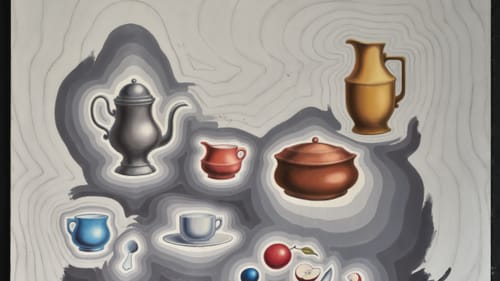Stay in the Loop
BSR publishes on a weekly schedule, with an email newsletter every Wednesday and Thursday morning. There’s no paywall, and subscribing is always free.
How others experience the world
The Michener Art Museum presents Selma Bortner and Franz Josef Ponstingl

The James Michener Art Museum of Doylestown is a repository of stunning works by Bucks County artists, reminding visitors that Pennsylvania is both a haven and an inspiration for remarkable artists. Two current exhibits honor the creativity of Selma Bortner and Franz Josef Ponstingl, artists who bloomed in our region, though their paths followed two very different trajectories.
Grandiose and personal
The Pfundt Gallery, in the rear of the museum, is an intimate space warmed by dramatic red walls that contrast the paintings of the collection Selma Bortner: The Journey, a retrospective of the titular late artist/art professor who taught painting and printmaking at Bucks County Community College.
Bortner’s work is both grandiose and personal. Her many series echo mythology and globe-spanning historical events, yet draw from deeply personal experiences. Her Aida series, referencing the goddess of myth grappling with her sense of worth as it relates to her beauty, was created during Bortner’s battle with breast cancer.
These pieces are rife with symbolism and animal motifs, richly layered in textiles on paper, hand-cut and pressed by Bortner herself, the deceptively crude and simple lines revealing lush tones and rich depths that imbue each piece with a luminous, timeless quality.
Bortner’s later works are rendered more realistically and vividly. Her Bomber series was inspired by the ongoing conflicts throughout the Middle East, drawing sharp parallels to her own parents’ immigration from the Ukraine. Bortner was concerned not with politicking, but with the human cost of the wars fought by the powerful. Her subjects are the mothers and children reeling from the tragedies inflicted on them. She renders their faces in perseverance, exhaustion, and hope, humanizing the statistics rattled off by newspaper headlines and political pundits.

Rescued surrealist fantasy
In contrast, Franz Josef Ponstingl’s display in the Beans Gallery is an open, airy space filled with surrealist fantasy scenes. Ponstingl was deeply inspired by Salvador Dali, most evident in his brightly colored abstracts and everyday objects, distorted through a dreamlike lens.
Ponstingl’s vision is brilliantly executed, a marriage of cold, repetitive imagery straight out of science-fiction, made warm and inviting with curved lines and candy colors. Alice’s Wonderland, 60s-style.
Drawing connections
Neither subject nor style is what truly separates either artist. Though they exist on opposite ends of the spectrum, their visions are arresting and thought provoking. There is a sadness in the comparison: while Bortner was respected and acknowledged in her field, with a rewarding double career as an educator, recognition for Ponstingl during his lifetime was nonexistent. Virtually all of this collection was salvaged from a Philadelphia thrift shop, where the artist donated his life’s work. Gallery owner Bert Baum was able to rescue the collection, but Ponstingl lived and died in relative obscurity.
Both collections invite the viewer to take a deeper look and draw connections, but in separate ways caution us to pay attention. There’s much to be lost when we fail to acknowledge how those around us experience the world.
What, When, Where
Selma Bortner: The Journey, through July 26, and Ponstingl: Dreams of Past Futures, through June 20. The Michener Museum, 138 S. Pine St., Doylestown, PA. (215) 340-9800 or michenerartmuseum.org.
The Michener Museum is wheelchair-accessible, and offers touch tours, ASL tours, and assistive equipment with advance notice.
Sign up for our newsletter
All of the week's new articles, all in one place. Sign up for the free weekly BSR newsletters, and don't miss a conversation.

 Michelle Nugent
Michelle Nugent